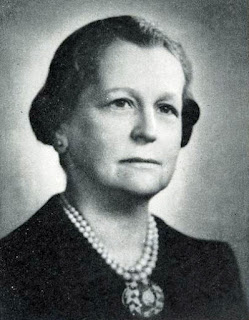Marie-Claire Daveluy was a Montreal-based librarian whose career spanned three decades in which she made a number of important contributions to Canadian library science. In 1937, she co-founded the École de bibliothécaires at the Université de Montréal. She served as this school’s chair for several years and sought to combine American library techniques within a French-Canadian context. Daveluy also helped establish the Association canadienne des bibliothécaires de langue française in 1943. A noted literary figure, her novels and short works for youth and children won her a number of meritorious awards. Daveluy pioneering efforts succeeded within a male dominated profession that adhered to moral and religious principles prescribed by the Catholic Church which governed many political and social institutions in Quebec before the 1960s “Quiet Revolution.”
Her portrait is taken from L'Académie canadienne-française by
Victor Barbeau (Montréal, c.1963), p 41. My biography appeared earlier
at the Ex Libris Association site in 2020.
Marie-Claire Daveluy
Born August 15, 1880, Montreal; Died January 21, 1968, Montreal.
Education:
Hochelaga Convent, Montreal
1920 Diploma in librarianship (McGill University summer library school)
1943 LL.D. (Université de Montréal)
Positions:
1920–1944 Assistant librarian, Bibliothèque municipale de Montréal
1932–1941 Head of cataloguing, Bibliothèque municipale de Montréal
Director of studies (1937–1942) and professor at the École de Bibliothécaires, Montréal
Publications (major contributions):
Daveluy, Marie-Claire (1919). L’orphelinat catholique de Montréal : en appendice la Société des dames de charité de 1827. Montréal: Imprimé au Devoir.
Daveluy, Marie-Claire (1923). Les aventures de Perrine et de Charlot. Montréal: Bibliothèque de l'Action française.
Daveluy, Marie-Claire (1926). Le filleul du roi Grolo suivi de La médaille de la Vierge. Montréal: Bibliothèque de l'Action française.
Daveluy, Marie-Claire and Jacques Laurent (1934). Jeanne Mance. Montréal: Albert Lévesque.
Daveluy, Marie-Claire (1936). Une révolte au pays des fées. Montréal: Albert Lévesque.
Daveluy, Marie-Claire (1938). Charlot à la Mission des martyrs. Montréal: Librairie Granger Frères.
Daveluy, Marie-Claire (1940). Le Richelieu héroïque: les jours tragiques de 1837. Montréal: Librairie Granger Frères.
Daveluy , Marie-Claire (1940). “L’École de bibliothécaires de l'Université de Montréal.” Culture: sciences religieuses et sciences profanes au Canada 1 (1) avril: 13-18.
Daveluy, Marie Claire (1944). ‘Les jeux dramatiques de l”histoire’; Que disaient nos aieules?; Le ‘Général” Vallières; Une visite inattendue; trois pièces en un acte. Montréal: Libr. Granger Fre’res.
Daveluy, Marie-Claire (1945). “L’École de bibliothécaires: son but — son enseignement.” L’Action Universitaire: Revue Des Diplômés de l’Université de Montréal 11 (10) juin: 119-125.
Daveluy, Marie-Claire (1947). “Ma carrière.” La bonne parole 37, no. 3 (mars): 3–7 and 37, no. 4 (avril): 6–9.
Daveluy, Marie-Claire (1948).“ L’École de bibliothécaires: son histoire, ses buts, ses initiatives,” Lectures: revue mensuelle de bibliographie critique 3, no 5 (janvier): 303–309.
Daveluy, Marie-Claire (1949). Essai d'un code de classement en langue française. Montréal: Éditions Fides.
Daveluy, Marie -Claire (1952). Instructions pour la rédaction des catalogues de bibliothèques. Montréal: Éditions Fides [vol. 1].
Daveluy, Marie-Claire and Jacques Laurent (1962). Jeanne Mance, 1606-1673. 2. éd., rev. et mise à jour. Montréal: Fides.
Daveluy, Marie-Claire (1965). La Société de Notre Dame de Montréal, 1639-1663: son histoire, ses membres, son manifeste. Montréal: Fides.
Associations:
Vice-President, Association canadienne des bibliothécaires de langue française.
Membership, executive and honorary positions in various associations: Académie canadienne-française, Société des écrivains canadiens, Fédération nationale Saint-Jean-Baptiste, Société historique de Montréal, Orphelinat Catholique.
Awards and Accomplishments:
Marie-Claire Daveluy was a literary author, librarian, bibliographer, and historian. She is likely best known as the author of popular children’s works exemplified by Les Aventures de Perrine et de Charlot. Her stories were based on historical themes and provided a moral compass for young children.
During her lifetime she was often at the forefront of cultural life and was accorded many honours.
—The first female member of the Société historique de Montréal in 1917.
—Prix David (Province of Quebec) awarded for literary merit in 1924 and 1934.
—Prix de l'Académie Française, Paris, awarded in 1934 for Jeanne Mance.
—Co-founder with Aegidius Fauteux, Émile Deguire, and Paul-Aimé Martin, of the École de Bibliothécaires de l'Université de Montréal.
—She helped found the Association canadienne des bibliothèques d'institutions in 1943 [known as the Association canadienne des bibliothécaires de langue française after 1948].
—Founding member of Académie canadienne-française in 1944.
—As a member of the Conseil de l’École de Bibliothécaires, she was a signatory to the declaration, “Les bibliothèques dans la province de Québec,” in 1944 which emphasized the public library as a responsible provincial educational institution for rural and urban communities.
—Médaille du centenaire, Société historique de Montréal awarded in 1958.
—Parc Marie-Claire-Daveluy, a small streetside spot in Montreal, was named in her honour in 1987.
Sources:
Chabot, Juliette (1968). “Marie-Claire Daveluy (1880-1968), bibliothécaire et femme de lettres.” Bulletin de l’Association canadienne des bibliothécaires de langue française 14(1): 12–15.
Morisset, Auguste Marie (1977). “Marie-Claire Daveluy, bibliothécaire, bibliographe, écrivain.” In Livre, bibliothèque et culture québécoise;: mélanges offerts à Edmond Desrochers, edited by Georges-Aimé Chartrand, vol. 1: pp. 405–423. Montréal: Asted.
Grivel, Marie-Hélène (2016). “Créer une littérature nationale au Québec: l’impact des textes de Marie-Claire Daveluy, de La presse aux sagas.” Strenae no. 11 (October).
Bienvenue, Louise (2018). “Marie-Claire Daveluy (1880-1968), historienne des femmes.” Histoire sociale/Social History, 51 (November): 329–352, DOI: https://doi.org/10.1353/his.2018.0029.
Lajeunesse, Marcel, Éric Leroux, and Marie D. Martel (2020). Pour une histoire des femmes bibliothécaires au Québec: portraits et parcours de vies professionnelles, “Marie-Claire Daveluy, bibliothécaire de carrière,” pp. 43–75. Québec, Presse de l'Université du Québec.
There is an excellent French language biography with a short English translation at Marie-Claire Daveluy in Wikipédia. Accessed December 17, 2021.




